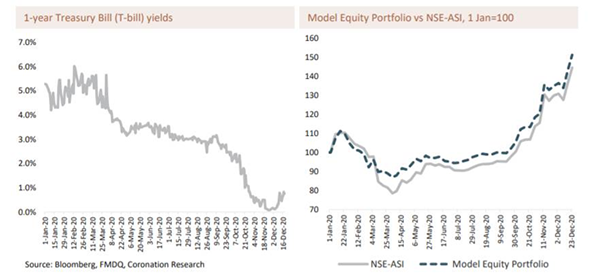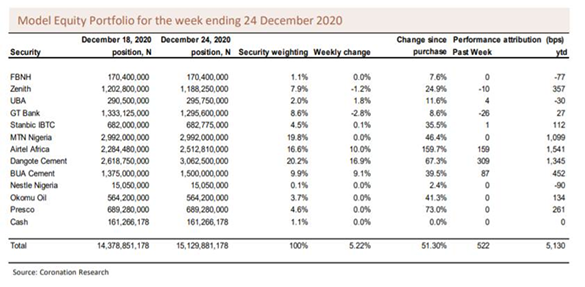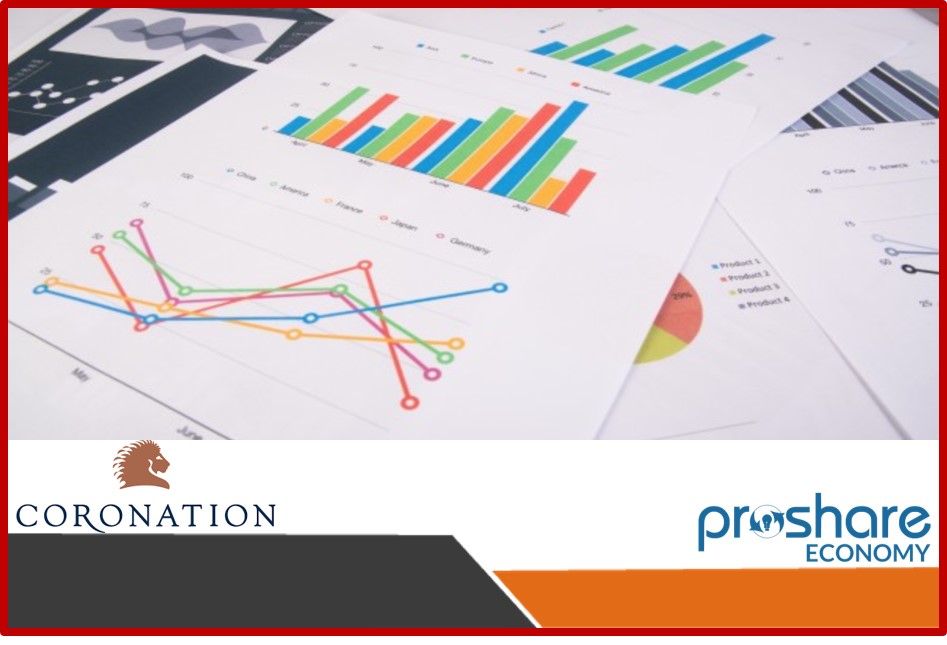Wednesday,December 30, 2020 /06:30 AM / By Coronation Research/ Header ImageCredit: Quick Admin Panel
2020 was dominated by the Covid-19 pandemic, the crashin commodity prices and the global recession. Right? Not quite. Looking backover the past 12 months in Nigeria we reason that domestic factors have drivenNigeria's financial markets: the intentional crashing of market interest rates,and the associated rally in the stock market. Nigeria was master of its ownmarkets in 2020, in our view. 2021 is likely to be a little different.
FX
Last week the exchange rate in the NAFEX market (alsoknown as the I&E Window and the interbank market) weakened by 0.46% toN392.65/US$1 on Thursday, 24 December. In the parallel, or street market, theNaira appreciated by 2.72% to close at N465.00/US$1. The impact of the CentralBank of Nigeria's (CBN) new rules on receipt of diaspora remittances isreflected in the continuing appreciation of the Naira in the parallel marketfrom N500/US$1 at the beginning of the month. According to the latest CBNBusiness Expectation Survey, respondent firms expect the Naira to depreciatethis month but to recover against the US dollar from February. Although we donot think that pressure on the parallel rate will be severe, we do not think itwill completely go away, either. We see the parallel rate being c.20% lowerthan the NAFEX rate over the coming weeks.
Bonds & T-bills
Last week, the secondary market yield for an FGN Nairabond with 10 years to maturity rose by 27 basis points (bps) to 6.58% and at 7years rose by 72bps to 5.58% while at 3 years the yield rose by 83bps to 3.60%.The annualized yield on a 308-day T-bill declined by 2bps to 0.63%, while theyield on a 306-day OMO bill rose by 23bps to 0.92%. In the Nigerian TreasuryBills (T-bill) market, trade volumes continued to be low as local banks remainrisk-off at current market levels with short- to long-dated papers. By andlarge, yields remained unchanged across the curve for both the T-bills. Thebond market remained in a negative mood last week. And on Friday yieldsexpanded further by an average of c.65bps across the benchmark bond curve. Wedo not expect a significant change in the current market sentiment over thecoming weeks.
Oil
The price of Brent crude fell by 0.41% last week toUS$51.29/bbl on Thursday 24 December. The average price, year-to-date, isUS$43.09 /bbl, 32.81% lower than the average of US$64.14 /bbl in 2019. Brentwas down last week despite earlier optimism about vaccines and a new stimuluspackage that was approved in the United States. Dragging on oil prices was abuild-up in crude oil inventories of 2.70 million barrels for the week ending18 December. Analysts had predicted an inventory draw of 3.14 million barrelsfor the week. A new strain of Covid-19 that caused border closures throughoutthe world created concerns that the global economic recovery would be delayed.We expect oil prices to remain close to US$50bbl for several weeks, though weawait the outcome of the OPEC meeting on 4 January which may change the levelof production cuts.
Equities
Last week, the Nigerian Stock Exchange All-Share Index(NSE-ASI) rose by 5.42% with a gain of 44.55% year-to-date to close at38,800.01. Dangote Cement (+16.95%), Oando (+15.92%), and Honeywell Flour Mills(+10.81%) closed positive while International Breweries (-5.90%), Ardova Oil(-5.24%) and Lafarge Africa (-4.55%) closed negative. We are concerned by thevelocity of the recent rally.
A Year in Two Charts
For Nigeria's financial markets 2020 was the year ofcrashing interest rates and of surging equities (the Nigerian Stock ExchangeAll-Share Index, NSE-ASI, is up 44.55%, so far). The first caused the second tohappen. And the first was unprecedented, at least over the past 10 years.During the years from 2010 to 2019 inclusive Treasury bill rates exceeded therate of inflation by 2.57 percentage points (pp), on average. Saving, whetherthrough building up bank deposits or mutual funds, was straightforward duringthis period, since the risk-free Treasury bill usually offered an attractivereturn. All that changed in 2020 when, over a period of 11 months, 1-yearT-bill rates fell from 5.40% to almost nothing.
Investors, not surprisingly, were not impressed withthis; some were indignant. Many of them were unaccustomed to taking risks toobtain an adequate return. And inflation stayed in double digits during 2020,rising to 14.89% y/y for November. A guide was required for them to begin tomeasure the returns they should expect from different asset classes. Wepublished Navigating the Capital Market, the Investor's Dilemma on 24 July, ourguide to fixed income and listed equity returns. 2020 was also the year whenmutual funds (collective investment schemes) took off, as savers began to turntheir back on banks (deposit rates were crashing) and to buy funds instead. Wecovered this phenomenon in Shifting the Appetite of Nigerian Investors: fromSavings to Mutual Funds, in October.

Exogenous factors were important in 2020: the firstwave of Covid-19 infections spread around the world in February; the associatedloss of confidence destroyed global growth. The crash in commodities, with oilbeing particularly badly hit, took income away from the Federal Government ofNigeria (FGN) and upset Nigeria's trade balance. Shortage of US dollar inflowsprompted the CBN to be parsimonious with its foreign exchange reserves (fromMarch onwards). Foreign exchange turnover on the NAFEX market (the I&Emarket) fell and the parallel rate re-emerged. Nigeria went into recession,though we think that it will prove to be not as severe as the 4.30% y/yfull-year recession which the IMF forecast back in June.
In some ways Nigeria's 2020 actually started inOctober 2019, when the CBN decided to bar most domestic institutions frombuying new issues of its open market operation (OMO) bills. This causedinstitutional liquidity to flow from the OMO market into the T-bill and bondmarkets, and it was this flow of liquidity that crashed rates. The CBN achievedone of its desired effects, with commercial bank lending rising significantly,having been stagnant during 2019. Through its cash reserve ratio (CRR), and theexcess CRR, it was possible to provide a high level of liquidity to the publicsector.
Towards the end of the CBN aided banks with theirliquidity by issuing them with N4.1 trillion (US$10.5bn) of Special Bills inrespect of their excess CRR. These bills carry a yield of 0.50% pa, and themarket has interpreted this as putting a floor under short-term interest rates.Indeed, the flow of liquidity from the OMO market into the T-bill market andthe bond market is a one-off event and cannot be repeated. Therefore, 2021 willbe very different from 2020, in our view. This is not to say that 2021 will bereverse of 2020, but market interest rates are already moving up. Our currentbase case is for a gentle rise in interest rates in 2021
Model Equity Portfolio
Last week the Model Equity Portfolio rose by 5.22%compared with a rise in the Nigerian Stock Exchange All-Share Index (NSE-ASI)of 5.42%, therefore underperforming it by 20 basis points. Year-to-date it hasgained 51.30% against a gain of 44.55% in the NSE-ASI, outperforming it by675bps.
For some weeks we have become concerned about the market'srally. It is one thing for Dangote Cement to rally on the back of an announcedshare buy-back: quite another thing for Airtel Africa to rise by 66.91% inthree weeks. If we take the four largest weights in the NSE-ASI, they haverallied a lot since the beginning of November: MTN Nigeria by 11.11%; AirtelAfrica by 107.65%; Dangote Cement by 53.13%; BUA Cement by 31.87%.
Shares in Airtel Africa are usually much less liquidthan many other NSE-listed stocks (for example, much less liquid than the principalbank stocks in which we hold notional positions). So, in the real world, itpossible for a relatively small amount of buying make the stock move a lot.True, the telecom sector does benefit from current consumption trends and datausage - there is some fundamental underpinning to the rally - but this seems tobe overdone.

We have protected ourselves during this rally byholding notional neutral positions in the four principal index weightsmentioned above. However, we are concerned that the rally will last until theend of the year (in two days) and not much further. We will therefore begin toreduce our notional positions in these stocks over the coming two days, raisethe level of cash, and review the situation early next week.
As we often write, we do not like to guess themarket's direction because we simplify our job to buying stocks we like whenthey are cheap: but (as was the case in early March), exceptional circumstancesrequire an exceptional response.
Relatedto Coronation
- Interest Rates on the Rise
- Oil Above US$50.00 per Barrel
- Saving Interest Rate?
- Where is the Money Going?
- CBN Likely to Leave MPR at 11.50%
- Second-best Equity Market in the World
- The Biden Effect
- US Dollar Eurobond Yields Now Higher Than Naira Yields?
- Fiscal and Monetary Response to Events
- Winners and Losers in Africa
- The Return of the Equity Market
- Which Way for Interest Rates?
- Coronation Research Releases Report Themed: From Savings to Mutual Funds
- A Case of Eurobond Market Contagion
- In the Hands of OPECplus
- The Policy Mix and The Markets
- The Oil Price and Production Paradox
- Cracks In The Bond Market?
- No Big Change in FX Policy
- Coronation Research Releases Outlook for Insurance Sector - From Lagoon To The Blue Ocean
- Micro-Insurance, Tech, Key to Deepening Nigeria's Insurance Sector - Coronation Research
- Navigating the Capital Market: The Investors' Dilemma
- Market Interest Rates Back Up - Coronation Research
Related News - Nigeria Economy
- PMI Readings Show Pessimism in the Month of December 2020
- FGN's Q3 2020 Deficit on Target, Spending Compressed
- CBN Poll: Respondent Firms Expect the Naira to Depreciate Next Month
- Economic Crisis to Sink 7million People into Poverty in Nigeria
- Revenue Collection Again Below Benchmark in Q3 2020
- CBN Poll: 60.8% of Respondents Believe Nigerian Economy would End Up Weaker if Prices Rise Faster
- The Nigeria's FX Crisis: Overarching Consequences of Insecurity and Structural Deficiency
- 2020: A Year to Remember or A Year to Forget? - LBS Executive Breakfast Session - December 2020
- NBS Publishes COVID-19 Impact Monitoring Survey Report for October 2020
- Border Reopened After Inflation Spiked
 Lagos, NG • GMT +1
Lagos, NG • GMT +1











 1268 views
1268 views














 Sponsored Ad
Sponsored Ad
 Advertise with Us
Advertise with Us









